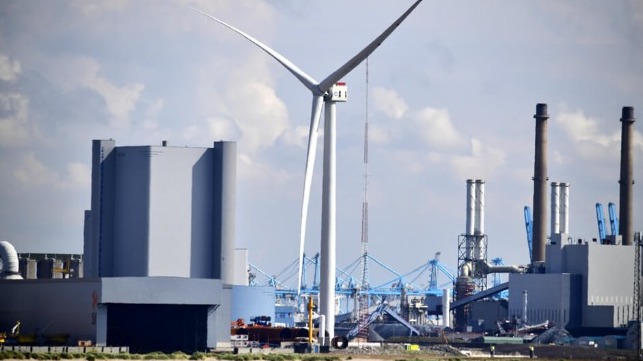GE Derisks Key Chinese-Made Ingredient for Offshore Wind Turbines

GE's wind turbine division plans to diversify its sourcing of a strategic ingredient by signing a supply deal with an Australian mining company, Arafura Resources. Arafura is developing a new project in central Australia to extract NdPr, a mixture of two rare-earth metals which is widely used to make the powerful magnets in wind turbine nacelles.
NdPr is a key ingredient in neodymium-iron-boron (NdFeB) magnets, the most powerful commercially available class of rare-earth magnets. These are an essential component for the high-power, compact generators found in wind turbines. It takes 600 kilos of NdFeB magnets for every MW of wind turbine generation capacity, according to GE, and the global supply only comes to about 170,000 tonnes a year - almost all of it from China. There is only one rare-earth mine in the United States, and U.S. clean-tech manufacturers are almost wholly dependent on Chinese suppliers for magnets.
Arafura's Nolans Project in Australia's Northern Territory could help change this. According to Arafura, Nolans could supply about five percent of global demand over about forty years in operation. It would handle its own processing and waste management on site, reducing uncertainty about environmental impact from third-party processing.
GE's agreement "charts a path for GE and Arafura to jointly co-operate in the establishment of a diversified and sustainable supply chain," with the hope that Arafura will become GE's preferred supplier of NdPr for renewables for the U.S. and EU markets. NdPr from Nolans may be used in magnets for GE’s Haliade-X, which ranks among the most powerful offshore wind turbines on the market.

that matters most
Get the latest maritime news delivered to your inbox daily.
At full buildout, the Nolans project would produce about 4,500 tonnes a year of NdPr oxide, 475 tonnes a year of heavy rare earth oxide, and neary 145,000 tonnes per year of phosphoric acid, a valuable feedstock for making fertilizer. (Arafura hopes to market the acid to customers in India). Hyundai Motor has already signed an offtake agreement for 1,000-1500 tonnes per year of NdPr oxide from Nolans, representing about a third of the mine's capacity.
The mine may be needed for more than just diversification of the supply chain. Arafura thinks that there could be an NdPr supply gap of up to 50,000 tonnes a year by 2030 as the growth in demand for electric cars and wind turbines takes off. Offshore wind will take flight on the same timetable and will have to source the same material. Analysts are forecasting the volume of annual offshore wind installations to more than triple from 6 GW in 2020 to 23 GW in 2025.
